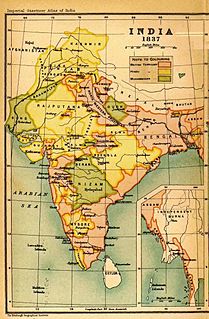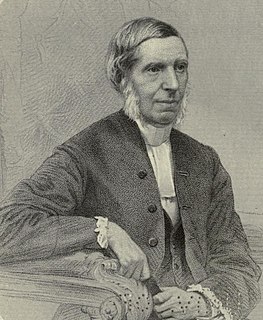
Marathi is an Indo-Aryan language spoken predominantly by around 83 million Marathi people of Maharashtra, India. It is the official language and co-official language in the Maharashtra and Goa states of Western India, respectively and is one of the 22 scheduled languages of India. With 83 million speakers as 2011, Marathi ranks 10th in the list of most spoken languages in the world. Marathi has the third largest number of native speakers in India, after Hindi and Bengali. The language has some of the oldest literature of all modern Indian languages, dating from around 600 AD. The major dialects of Marathi are Standard Marathi and the Varhadi dialect. Koli, Agri and Malvani Konkani have been heavily influenced by Marathi varieties.

Sir James Fitzjames Stephen, 1st Baronet, KCSI was an English lawyer, judge and writer.

Whitley Stokes, CSI, CIE, FBA was an Irish lawyer and Celtic scholar.

Ushaw College, is a former Catholic seminary near the village of Ushaw Moor, County Durham, England, which is now a heritage and cultural tourist attraction. The College is known for its Georgian and Victorian Gothic architecture and listed nineteenth-century chapels. The College now hosts a programme of art exhibitions, music and theatre events, alongside tearooms and a café.
Lieutenant-General George Noble Molesworth, idc (1890–1968) was an officer commissioned into the British Army serving in India and saw active service in the Third Anglo-Afghan War. He later transferred to the British Indian Army and rose to oversee intelligence and to be Deputy Chief of General Staff of Army Headquarters India. He also served as Military Secretary to the India Office.
Marathi literature is the body of literature of Marathi, an Indo-Aryan language spoken mainly in the Indian state of Maharashtra and written in the Devanagari and Modi script.

Yashwantrao Balwantrao Chavan was an Indian politician. He served as the last Chief Minister of Bombay State and the first of Maharashtra after latter was created by the division of Bombay state. His last significant ministerial post was as the Deputy Prime Minister of India in the short lived Charan Singh government in 1979. He was a strong Congress leader, co-operative leader, social activist and writer. He was popularly known as Leader of Common People. He advocated social democracy in his speeches and articles and was instrumental in establishing co-operatives in Maharashtra for the betterment of the farmers.

Sir George Christopher Molesworth Birdwood was an Anglo-Indian official, naturalist, and writer.

Ernest Binfield Havell, who published under the name E.B. Havell, was an influential English arts administrator, art historian and author of numerous books about Indian art and architecture. He was a member of the Havell family of artists and art educators. He was the principal of the Government School of Art, Calcutta from 1896 to 1905, where, along with Abanindranath Tagore, he developed a style of art and art education based on Indian rather than Western models, which led to the foundation of the Bengal school of art.

John Borthwick Gilchrist was a Scottish surgeon, linguist, philologist and Indologist. Born and educated in Edinburgh, he spent most of his early career in India, where he made a study of the local languages. In later life, he returned to Britain and lived in Edinburgh and London. In his final years, he moved to Paris, where he died at the age of 81.

Nanalal Dalpatram Kavi was an Indian writer and poet in Gujarati language. of Gujarati literature. His name is sometimes spelled as Nhanalal.

Bhulabhai Desai Road, also well known by the old name Warden Road, is a niche up-market residential and semi-commercial locality of South Mumbai.

The candy or candee, also known as the maunee, was a traditional South Asian unit of mass, equal to 20 maunds and roughly equivalent to 500 pounds avoirdupois (227 kilograms). It was most used in southern India, to the south of Akbar's empire, but has been recorded elsewhere in South Asia. In Marathi, the same word was also used for a unit of area of 120 bighas, and it is also recorded as a unit of dry volume.
Hilda Mary Lazarus CBE, MStJ, MRCS, FRCSE was a Christian missionary and popular gynecologist and obstetrician in India. She was Principal of Andhra Medical College and Superintendent of King George Hospital at Visakhapatnam. She was also the first Indian director of Christian Medical College and Hospital at Vellore.
National Translation Mission is a Government of India initiative to make knowledge texts accessible, in all Indian languages listed in the VIII schedule of the Constitution, through translation. NTM was set up on the recommendation of the National Knowledge Commission. The Ministry of Human Resource Development has designated Central Institute of Indian Languages as the nodal organization for the operationalization of NTM.

Rev Dr John Wilson DD FRS was a Scottish Christian missionary, orientalist and educator in the Bombay presidency, British India.
James Thomas Molesworth was a military officer in the services of the British East India Company, and one of the most prominent lexicographers of the Marathi language.

Maharashtra is a state in the western region of India. It is India's second-most populous state and third-largest state by area, and includes the major cities of Mumbai, Pune, Nagpur, Aurangabad and Nashik. The region that comprises the state has a long history dating back to the 4th century BCE, although the present-day state was not established until 1960 CE.
Parshuram Ballal Godbole was a Marathi lexicographer, editor, and translator.
Marathi Language Day is celebrated on February '27' every year across the Indian states of Maharashtra and Goa. This day is regulated by the State Government. It is celebrated on Birthday of eminent Marathi Spokesman Kusumagraj.













